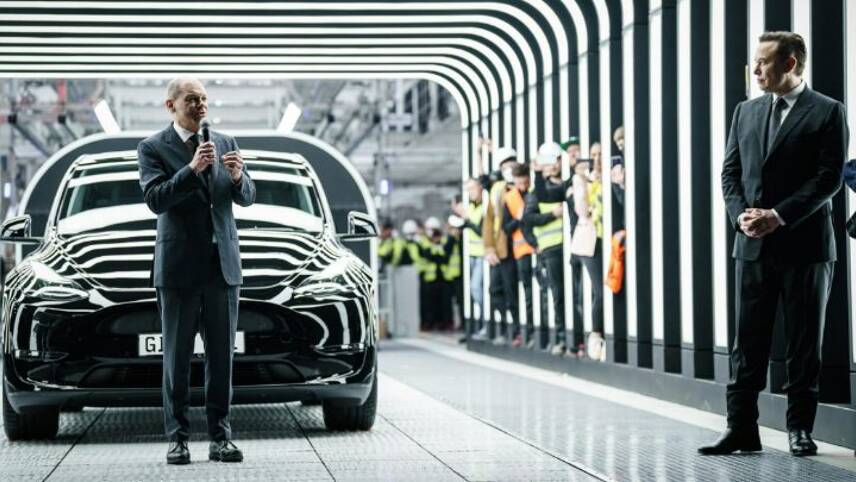Register for free and continue reading
Join our growing army of changemakers and get unlimited access to our premium content

Pictured: German Chancellor Olaf Sholz and Elon Musk. Image: Olaf Scholz
At an opening ceremony held at the plant on Tuesday morning, Musk handed over the first 30 electric vehicles (EVs) produced at the site to clients and confirmed that 3,000 people have been hired to staff the facility.
🇩🇪🇩🇪 Danke Deutschland!! 🇩🇪🇩🇪
— Elon Musk (@elonmusk) March 22, 2022
In time, it will grow to employ 12,000 staff. At full capacity, it will produce 500,000 cars each year. Musk has stated that scaling production will take longer than two years.
German Chancellor Olaf Scholz attended the site, alongside Musk and German Climate Minister Robert Habeck, to deliver the opening ceremony. Sholz has stated on Twitter: “The opening of the Tesla plant in Brandenburg is an important sign: Germany is a strong location for industrial investments. This is how we succeed in becoming carbon-neutral and leading the transformation. The future belongs to e-mobility.”
Germany, like other EU member states, is working towards net-zero by 2050 and a 55% reduction in emissions by 2030. It this week outlined plans to end the sale of new petrol and diesel cars from 2035 onwards, as it works to reach this goal while also minimising Russian energy imports.
Europe’s largest EV player at present is Volkswagen (VW), with 25% of the market share compared with Tesla’s 13%. However, once the Tesla factory is scaled up, the business will be able to produce more EVs in Europe annually than VW did last year.
Tesla has reportedly invested more than €5bn (£4bn) in the factory – the biggest investment in a German car plant in recent history. As well as battery cell production and EV production lines, the site features a water recycling facility, a depot and a local fire brigade. The Gigafactory is Tesla’s fifth, following the opening of four in the US. A sixth, in Texas, is slated to open later this year.
A project mired in environmental controversy
Speaking at the ceremony, Musk called the opening of the Gigafactory “another step in the direction of a sustainable future”. Tesla has stated its mission as “accelerating the world’s transition to sustainable energy” and “accelerating the advent of sustainable transport by bringing compelling, mass-market electric cars to the market”.
While the cars are fully electric and the Tesla charging network powered with only renewable electricity, Tesla has been fiercely criticized over the impact of the German Gigafactory on the local environment.
Tesla was ordered to halt the construction of the Gigafactory back in February 2020, with a court order condemning the clearance of more than 90 hectares of forest. The higher administrative court of Berlin-Brandenburg then refused to make the temporary injunction permanent, paving the way for Tesla to restart forest clearance in December 2020.
Tesla has also faced setbacks from green campaigners as the site partly overlaps a drinking water protection zone and borders on a nature reserve.
In total, more than 400 objections have been raised against Tesla over the project.
Musk has defended the project by arguing that the forest is not a natural forest – it was planted for forestry products – and that environmental groups are over-estimating how much water the plant will consume. He has also confirmed that it will host a water recycling plant and that Tesla will plant three trees for each one felled to make way for the factory.
Several groups of protesters were at the site for the opening ceremony, continuing to raise these issues.
Sarah George


Please login or Register to leave a comment.